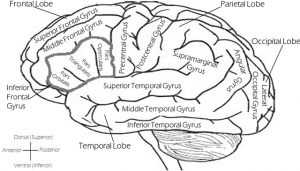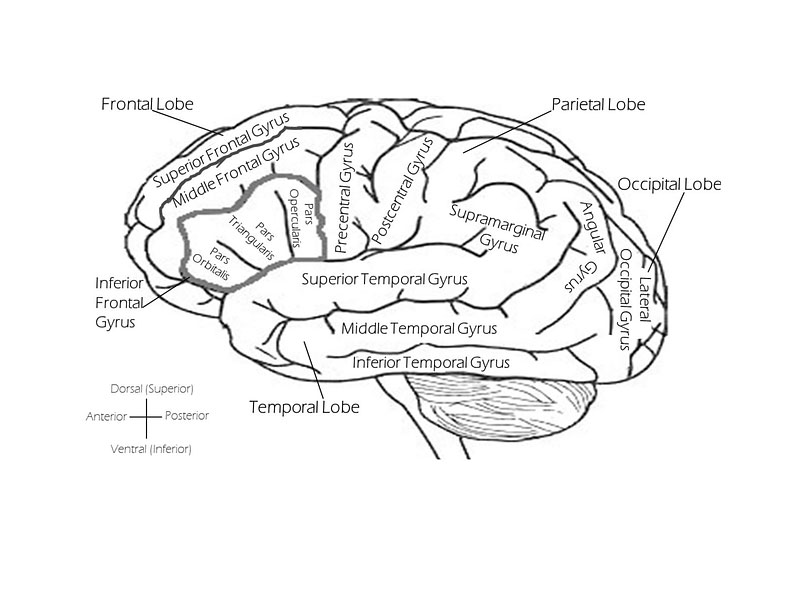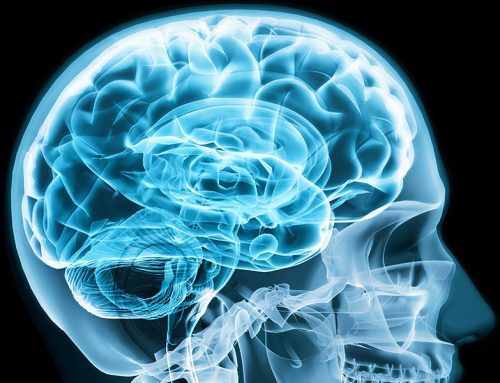As we get older, the brain changes physically. It begins to shrink in size after the age of 40 and especially after the age of 70. The prefrontal cortex – associated with cognitive function – is particularly susceptible to shrinkage. The volume of both white and gray matter is reduced in elderly individuals. With increasing age, there are reductions in the levels of the neurotransmitters acetylcholine, dopamine, and serotonin [Mantle 2021].

Coenzyme Q10 has important roles in cellular energy generation and cellular antioxidant protection in the brain. The ageing brain synthesizes less Coenzyme Q10 with the passing of the years. The big question in CoQ10 research is whether Coenzyme Q10 from supplements will cross the blood-brain barrier.
Ageing Brain More Vulnerable to Oxidative Stress
Moreover, increasing age is associated with mitochondrial dysfunction in the brain tissue cells. The mitochondrial dysfunction is characterized by 1) reduced ATP energy production and 2) increased generation of harmful free radicals. The resulting oxidative stress has been associated with normal ageing processes and with the development of neurodegenerative diseases [Mantle 2021].
Coenzyme Q10 Needed for Brain Energy and Defense
Brain cells are big consumers of energy, using an estimated 20% of all energy used in the body. Coenzyme Q10 is an essential component in the process of cellular ATP energy generation and is an important antioxidant that protects cells against oxidative damage. In addition, Coenzyme Q10 has been shown to have anti-inflammatory effects [Mantle 2021].
Reduced CoQ10 Bio-Synthesis with Increasing Age
Most of our daily CoQ10 requirement comes not from our diets but from endogenous bio-synthesis. Increasing age is associated with decreased bio-synthesis of Coenzyme Q10. The concentrations of Coenzyme Q10 in the heart, the liver, and the kidneys are significantly reduced at age 80 compared to age 20 [Kalén 1989].
CoQ10 levels in brain tissue have not been assessed in the same way, but it seems reasonable to assume that also in the brain, the CoQ10 concentrations decline with increasing age; hence, the need for CoQ10 supplementation [Mantle 2021].
Age-Related CoQ10 Decline and Age-Related Decline in Neurological Function
Coenzyme Q10 is known to be present in all areas of the brain. The age-related decline in endogenous CoQ10 biosynthesis parallels the age-related changes in neurological function and the development of some neurodegenerative diseases. Accordingly, it is logical to ask whether CoQ10 supplementation can ameliorate cognitive decline in elderly individuals [Mantle 2021].
Combined CoQ10 and Selenium Supplementation of Elderly Individuals
Both Coenzyme Q10 and selenium are necessary for optimal cell function in the body. The intake of selenium is low in much of Europe, and the endogenous synthesis of Coenzyme Q10 decreases as age increases.
With these facts in mind, Prof. Urban Alehagen and a team of researchers carried out a four-year intervention study using combined Coenzyme Q10 and selenium supplementation or matching placebos in a cohort of 443 Swedish senior citizens [Alehagen 2018].
The KiSel-10 study data showed that the combined supplementation was significantly associated with a reduction death from heart disease and with an improvement in heart function. Sub-analyses of the KiSel-10 study data showed, further, that the combined supplementation was significantly associated with reductions in blood biomarkers of oxidative stress, inflammation, and fibrosis [Alehagen 2018].
Coenzyme Q10 and Improved Health-Related Quality of Life in Senior Citizens
The combined CoQ10 and selenium supplementation was also associated with improved health-related quality of life, and more days out of hospital.
The KiSel-10 study researchers did not evaluate the effect of the CoQ10 and selenium supplementation on measures of cognitive function or neurological function.
Conclusion: Coenzyme Q10 from Supplements Crossing the Blood-Brain Barrier?
- Optimal concentrations of Coenzyme Q10 are needed for energy generation and antioxidant defense in brain cells.
- With increasing age, brain cells most likely synthesize less and less Coenzyme Q10.
- In the q10facts.com article to follow this article, we will present the results from a cell model study of Coenzyme Q10 and brain tissue from mice and pigs.
- The question to be answered is: does exogenous Coenzyme Q10 cross the blood-brain barrier, and, if so, under what conditions?
Sources
Alehagen U, Aaseth J, Alexander J, Johansson P. Still reduced cardiovascular mortality 12 years after supplementation with selenium and coenzyme Q10 for four years: A validation of previous 10-year follow-up results of a prospective randomized double-blind placebo-controlled trial in elderly. PLoS One. 2018;13(4):e0193120.
Johansson P, Dahlström Ö, Dahlström U, Alehagen U. Improved health-related quality of life, and more days out of hospital with supplementation with selenium and Coenzyme Q10 combined. Results from a double blind, placebo-controlled prospective study. J Nutr Health Aging. 2015 Nov;19(9):870-7.
Kalén A, Appelkvist EL, Dallner G. Age-related changes in the lipid compositions of rat and human tissues. Lipids. 1989 Jul;24(7):579-84.
Mantle D, Heaton RA, Hargreaves IP. Coenzyme Q10, Ageing and the Nervous System: An Overview. Antioxidants (Basel). 2021 Dec 21;11(1):2.
The information presented in this review article is not intended as medical advice and should not be used as such.
30 July 2022





Thanks so much!!!